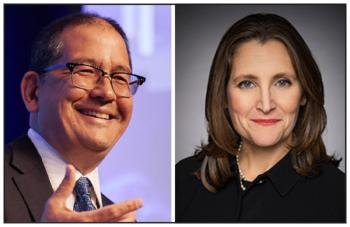Image Caption
Local Journalism Initiative Reporter
Windspeaker.com
Canada’s Deputy Prime Minister Chrystia Freeland was among the 1,700 delegates attending the two-day First Nations Major Projects Coalition (FNMPC) conference that concluded Tuesday in Toronto.
Freeland, who is also the minister of Finance, took part in the “Ministerial Panel On Indigenous Loan Guarantees And Economic Growth” on that final day, April 23.
Freeland touted the $5 billion Indigenous Loan Guarantee Program, which she announced April 16 as part of the 2024 federal budget. The program provides affordable capital for Indigenous equity participation in natural resource and energy projects.
Freeland said the concept of the program had been in the works for several years.
“It’s a really big deal,” she told the Indigenous leaders, businesspeople and government representatives gathered.
“I think this is one thing in the budget that every single person in Canada supports.”
Freeland said “Indigenous economic participation in the major projects that are going to build our country and our economy going forward is an essential step.
“I’m even going to say it’s the essential step in building Indigenous economic prosperity and economic reconciliation.”
Freeland said the program is going to make major projects better.
“I really believe that Indigenous participation in these projects is going to mean we do them the right way from the start," she said.
“I also am absolutely convinced, for that reason, that these projects are going to get built faster. This is an approach that is going to, first and foremost, advance Indigenous economic prosperity. It’s going to advance prosperity for all of Canada and all Canadians.”
Mark Podlasly, FNMPC’s chief sustainability officer, moderated the panel.
“For FNMPC members, this has been a cause for us from the beginning,” he said. Access to competitively priced capital for equity investments “is one of the founding reasons for the creation of the FNMPC nearly a decade ago,” he said.
The FNMPC is a national group made up of more than 150 First Nations elected councils, hereditary chiefs, tribal councils and development corporations. This year was the coalition’s seventh annual conference.
Like Freeland, Podlasly praised the program announcement. And he provided some background on why he anticipates it will usher in change.
“Our First Nations have historically been precluded from capital markets or accessing assets because of the colonial structures of the Indian Act,” he said. “The Indian Act deems us as wards of the state and all our assets are then held in trust by the government, which makes it very difficult for us, even though we control lands, we don’t legally own them. Or assets for that matter.”
Podlasly is confident the new program will be beneficial.
“By our modelling, we know that there’s billions and billions of dollars of projects waiting to happen in this country, which will be unlocked by this program,” he said. “This should see a transfer of wealth to First Nations, which is historic in the founding of Canada and in the history of our country.”
Freeland was asked to provide details of how the program will work.
“This is a sector agnostic program,” she said. “That was very important personally to me. It is not for any federal government minister to choose for Indigenous peoples the projects that you want to participate in. I believe that so strongly. And that is a guiding principle of this program.”
Freeland acknowledged that implementation of the program will not be an easy task.
“We also realized that these are big projects,” she said. “They’re really challenging. The financing is challenging to sort out. It’s complicated. The financial structures are complicated. The projects themselves are complicated.”
As a result, Freeland said support will be delivered through Natural Resources Canada to assist Indigenous participants to gain access to the program.
“We have also set up in the budget in the Privy Council Office—that’s like the heart of the public service—a special office to get clean energy projects done faster,” she said.
“And I think that there will be some really excellent collaboration between that office and some of the major projects that I hope we will see funded through the $5 billion Indigenous Loan Guarantee Program.”
Local Journalism Initiative Reporters are supported by a financial contribution made by the Government of Canada.

